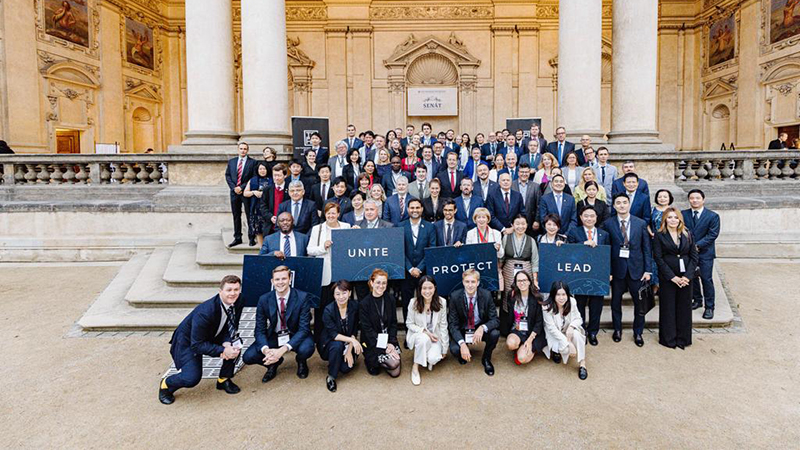Prague —Deputy Speaker of the Tibetan Parliament-in-Exile, attended the third summit of the Inter-Parliamentary Alliance on China (IPAC) held in Prague from 1 to 2 September 2023. Deputy Speaker said,"CCP is targeting the fundamentals of the Tibetan identity- our language and religion, which is also the bedrock of our civilization. Beijing’s effort to control the highest and most revered person of Tibet proves that CCP has no legitimacy to rule Tibet legally, politically and morally."
The third Inter-Parliamentary Alliance on China (IPAC) Prague 2023 Summit was held at the Czech Chamber of Deputies and Senate in Prague, Czech Republic, from 1 to 2 September 2023, attended by 50 legislators from 30 countries. Three new countries joined the IPAC network: three legislative bodies from the Philippines, Kenya and Paraguay. Deputy Speaker Dolma Tsering Teykhang, representing the Tibetan Parliament in Exile, attended the summit.
The third annual IPAC summit was hosted by the Czech co-chairs, MP Eva Decroix and Senator Pavel Fischer. Participants were welcomed by speeches from Marketa Pekarova Adamova, Speaker of the Czech Chamber of Deputies, Jan Lipavsky, Minister of Foreign Affairs of the Czech Republic, and Joseph Wu, Foreign Minister of Taiwan.
Participants discussed democratic strategies in response to the multiple challenges posed by the expansionist Chinese Communist Party to the rules-based order, global peace and stability, and freedom and democracy. The summit focused on six China-related themes: Taiwan, renewable dependence, transnational repression, Hong Kong, the Belt and Road, and human rights.
Deputy Speaker Dolma gave a presentation on the most critical human rights issues facing Tibetans at the hands of the Chinese authorities in Tibet. The Deputy Speaker said, "CCP is targeting the fundamentals of the Tibetan identity- our language and religion, which is also the bedrock of our civilization. Beijing’s effort to control the highest and most revered person of Tibet proves that CCP has no legitimacy to rule Tibet legally, politically and morally."
Deputy Speaker Dolma urged, "complying with the dictates of PRC without understanding the history of Tibet by many governments emboldens PRC to press territorial claims elsewhere, mostly using false or misleading historical narratives similar to those it uses to justify its claim to Tibet. Thus, the world must know that PRC is the biggest threat to democracy in the modern world and Tibet is the frontier to contain China that must be dealt with multilaterally. Therefore, I urge you to place the human rights situation in Tibet in the context of the nature of the Tibet- China conflict as international and unresolved."
Deputy Speaker Dolma reminded the audience that, "Making the leadership of PRC a responsible stakeholder in the world order is not only in the interest of all those who are suffering under the communist regime, but it is also in the interest of PRC and the Chinese people. She called on everyone to join hands to make the world a better place where everyone can live in peace and harmony.
The deputy speaker spoke about environmental challenges and the importance of the Tibetan plateau for Asia and the world. She said that this blue planet is our only home and that for a global understanding of global warming and the environmental challenges facing humanity, world leaders must recognise the global importance of the Tibetan Plateau. She called on them to initiate scientific research to understand the impact and critical role of the Tibetan plateau on global climate change, under the auspices of the United Nations.
The deputy speake also stressed that, "In a nutshell, CCP is targeting the fundamentals of the Tibetan identity- our language and religion, which is also the bedrock of our civilization. Beijing’s effort to control the highest and most revered person of Tibet proves that CCP has no legitimacy to rule Tibet legally, politically and morally." She concluded by thanking the legislatures, their governments and the people for standing for Tibet, for standing for truth and for keeping alive our faith in peace and justice.
After two days of meetings, the third Inter-Parliamentary Alliance on China (IPAC) in Prague issued a communiqué in which it declared: "The PRC’s march towards achieving international dependency upon China across critical industries and new technologies continues apace - from raw minerals to cellular modules. Persecution of minority groups both in China and abroad has intensified. Beijing’s crackdowns in Hong Kong, Tibet, and the Xinjiang Uyghur Autonomous Region continue unimpeded by international outrage. Tensions across the Taiwan Strait have been stoked by Beijing steadily. The scope and penetration of the PRC’s foreign interference, together with its intimidation of minority groups has provoked an alarmed response from the international intelligence community."
"PRC-perpetrated transnational repression sprung to the forefront of international media attention and debates following reports on the establishment of illegal “overseas police service centers” by PRC public security authorities in over 50 countries around the world. Open-source evidence directly connected these liaison stations to clandestine “fugitive recovery” operations by PRC actors in cooperation with united front-linked organizations," the statement added.
"While the PRC is far from the only authoritarian actor to engage in transnational repression efforts, according to Freedom House the authoritarian regime in China conducts “the world’s most sophisticated, comprehensive, and far-reaching campaign of transnational repression”. Ultimately, the Chinese Communist Party (CCP) seeks to exert control over all overseas Chinese citizens and members of diaspora communities. Part of its foreign interference campaigns, it represents the counter-side to the PRC’s influence operations, aimed at setting narratives and policies abroad that are consistent with CCP preferences and geopolitical objectives," the communiqué of IPAC stated.
IPAC stated, "Transnational Repression is an increasingly prevalent phenomenon whereby states reach across borders to harm, intimidate, and silence journalists, activists, dissidents, and diaspora communities. More broadly, it can be described as any attempt to silence or adversely influence independent democratic discourse on authoritarian actors."


![Tibet has a rich history as a sovereign nation until the 1950s when it was invaded by China. [Photo: File]](/images/stories/Pics-2024/March/Tibet-Nation-1940s.jpg#joomlaImage://local-images/stories/Pics-2024/March/Tibet-Nation-1940s.jpg?width=1489&height=878)


















